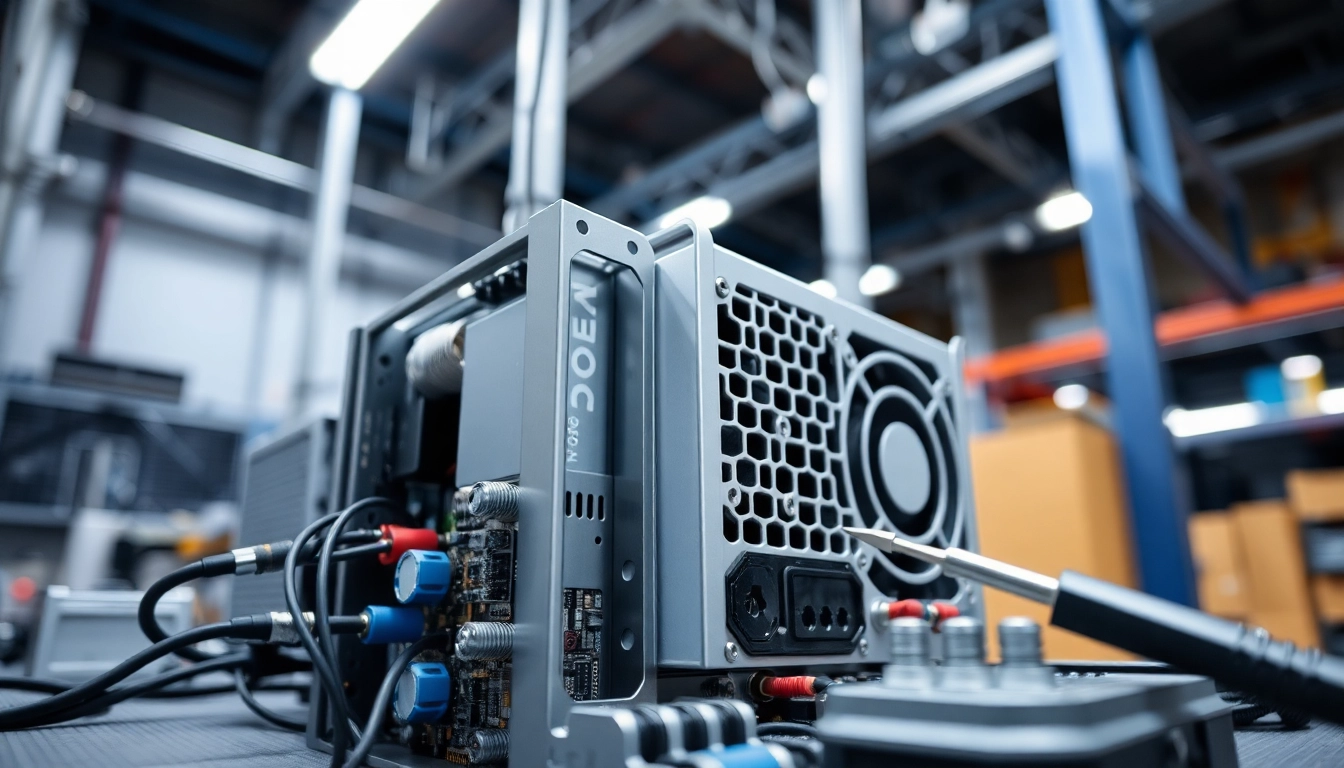Understanding Power Supply Manufacturing
The power supply unit (PSU) is a crucial component in any electronic device, converting electrical energy from a power source to the required voltage and current to power the device efficiently. Whether you’re assembling a gaming PC, building an industrial machine, or setting up a home theater system, understanding the role of Power Supply Manufacturers is essential. In this article, we will delve into what power supplies are, the importance of manufacturers in ensuring quality and reliability, the types of power supplies available, and key market players. We’ll also explore the trends shaping the future of power supply manufacturing.
What is a Power Supply?
A power supply is an electrical device that supplies power to various components of an electronic system. It converts electrical energy from a source (like a wall outlet or battery) into the voltage and current required for the device’s operation. Power supplies can be classified into two main categories: alternating current (AC) supplies, which provide current that changes direction periodically, and direct current (DC) supplies, which provide a constant direction of current. The choice between these types depends on the application’s specific requirements.
The Role of Power Supply Manufacturers
Power supply manufacturers play a pivotal role in the electronics industry, providing the equipment and technology that ensure devices operate efficiently and safely. They design, engineer, and manufacture power supplies tailored to meet diverse application needs, adhering to strict safety and performance standards. A reputable manufacturer not only guarantees product reliability but also invests in research and development to foster innovation in power supply technology.
Types of Power Supplies Offered
Power supplies come in various types to meet different demands. Some of the most common types include:
- Linear Power Supplies: Known for simplicity and low noise, these supplies provide a steady output voltage and are often used in communication and audio applications.
- Switching Power Supplies: More efficient and compact than linear supplies, switching power supplies rapidly switch on and off to regulate output, making them ideal for computer systems and consumer electronics.
- Uninterruptible Power Supplies (UPS): These supplies provide backup power during outages, ensuring critical systems remain operational, commonly used in data centers.
- Custom Power Supplies: Many manufacturers offer tailor-made solutions to meet specific requirements, catering to industries like telecommunications, medical devices, and aerospace.
Key Players in the Power Supply Manufacturing Industry
The power supply market is populated by numerous manufacturers, ranging from established giants to emerging innovators. Each brings unique features and advantages to the table, making careful selection crucial for consumers and businesses alike.
Leading Brands and Their Offerings
Several brands stand out in the power supply manufacturing landscape. Companies such as Corsair and Seasonic are highly regarded for their reliability and impressive performance, particularly among PC builders and gamers. Brands like MEAN WELL and XP Power specialize in industrial power supplies, providing solutions that meet stringent regulatory standards.
For instance, Corsair is known for its RMx series, offering efficient operation with minimal noise. Users often recommend this series for high-performance builds that require stable and reliable power delivery. Similarly, Seasonic is praised for its robust designs and longevity, making it a favorite among enthusiasts who prioritize quality.
How Manufacturers Differentiated Themselves
In an increasingly competitive market, manufacturers have differentiated themselves through several key areas:
- Innovation: Many manufacturers invest heavily in R&D to introduce cutting-edge technologies, such as modular design and smart power management systems.
- Efficiency Ratings: Power supply units are often rated for energy efficiency, with programs like 80 PLUS certification helping consumers identify economical choices. Brands that achieve high efficiency ratings often stand out in the market.
- Customer Support & Warranty: Strong customer service and robust warranty programs are vital differentiators, as consumers seek assurance when investing in critical components like power supplies.
Emerging Manufacturers to Watch
While established brands dominate the market, several emerging manufacturers are gaining traction. Companies like Aegis Power Systems are starting to carve a niche by focusing on custom applications and high-performance industrial solutions. As technology evolves, these smaller manufacturers are likely to challenge larger incumbents by addressing specific market needs with innovative approaches.
Assessing Quality and Reliability
Choosing the right power supply is not merely about picking a brand; it involves thorough assessment of quality and reliability based on various factors.
What to Look for in a Manufacturer
When evaluating potential manufacturers, consider the following criteria:
- Track Record: Look for manufacturers with a strong history in the market, as this often correlates with product reliability.
- Product Range: A manufacturer that offers a wide range of power supply solutions is often better equipped to meet diverse needs and adapt to technological advancements.
- Customer Feedback: Research consumer reviews and testimonials to understand how products perform in real-world scenarios.
Certifications and Industry Standards
Certifications are crucial indicators of quality and reliability. Reputable manufacturers adhere to industry standards such as ISO 9001 for quality management and ISO 14001 for environmental management. Additionally, safety certifications like UL, CE, and RoHS compliance demonstrate a commitment to producing safe and environmentally friendly products.
Consumer Reviews and Feedback
Consumer reviews are invaluable for assessing product reliability and manufacturer reputation. Platforms like Reddit features discussions where users recommend brands and share experiences, providing insight into how different power supplies hold up under various conditions. Paying close attention to common strengths and weaknesses noted by users can aid significantly in making a well-informed decision.
Finding the Right Power Supply for Your Needs
Selecting the right power supply hinges on understanding your specific requirements, whether for personal projects, gaming, or industrial applications. Here are the key considerations:
Choosing Between AC and DC Supplies
The choice between AC and DC power supplies depends largely on the application. AC supplies are typically used in household and industrial settings, while DC supplies are preferred for sensitive electronic devices, which require constant voltage for optimal functioning. Understanding your specific application needs will help guide your decision.
Understanding Wattage and Efficiency Ratings
Wattage ratings indicate the maximum power a power supply can deliver without risking failure or damage. It’s critical to choose a PSU with a wattage rating that exceeds the total power consumption of your system to ensure stability. Additionally, efficiency ratings, such as the 80 PLUS certification, provide insight into how effectively a PSU converts AC power to DC power. Higher efficiency units waste less energy as heat, promoting better performance and longevity.
Matching Power Supplies to Your Equipment
Choosing a power supply requires careful consideration of your equipment’s power needs. For instance, high-end gaming rigs may require PSUs with modular capabilities to manage cables efficiently and reduce clutter. Conversely, simpler builds might benefit from non-modular supplies, which often come at a lower cost. Thoroughly researching power requirements from all components, such as CPUs, GPUs, and peripherals will guide you in selecting the most suitable power supply.
Future Trends in Power Supply Manufacturing
As technology continues to evolve, so does the field of power supply manufacturing. Here are some future trends to watch:
Technological Advancements and Innovations
Manufacturers are increasingly integrating smart technology into power supplies. Innovations such as digital power management systems allow for precise monitoring and adjusting of voltage levels, enhancing efficiency and performance. Furthermore, advances in materials science, including the use of gallium nitride (GaN), are enabling smaller, lighter, and more efficient power supplies.
The Shift Towards Sustainable Power Solutions
With growing awareness of environmental issues, the power supply industry is pivoting toward sustainability. Manufacturers are exploring greener production methods, eco-friendly materials, and energy-efficient designs. Companies are not only seeking to reduce their carbon footprint but also to develop products that support renewable energy initiatives.
Predictions for the Next Decade in Manufacturing
Looking forward, the power supply manufacturing landscape is likely to be characterized by intense competition driven by technological innovation and sustainability goals. As consumer electronics demand continues to rise, manufacturers that adapt quickly to technological changes while maintaining quality will likely emerge as market leaders. Enhanced focus on customer experience, through support and feature-rich products, will also shape competitive strategies moving forward.



